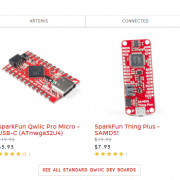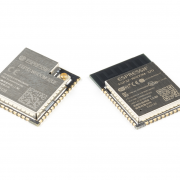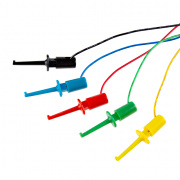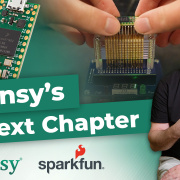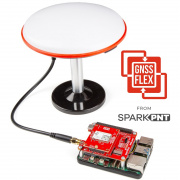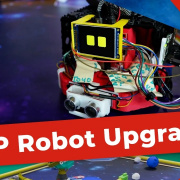SparkFun's 2020 in Review
We take a look back at the five years of 2020 and our favorite posts and products!
As a reminder, SparkFun will be closed on Friday, January 1st. We will reopen at 9:00 a.m. MST on Monday, January 4th. Happy New Year!
Hello everyone, and welcome to the final day of 2020! You may have thought this year would never end, but guess what dear reader, it's over. In celebration of the new year, we decided to take a look back at some of our favorite products, projects and tutorials. We also made a fun page that highlights our SparkFun Original releases as well as a photojournalism project our photographer Juan made in the early days of the pandemic.
Products
As insane as this year was, it didn't mean we could slow down with new products released each Friday. In fact, we we went into overdrive with new ideas. MicroMod or the RTK Surveyor would probably never have existed if Nate wasn't bored at home in April! Let's take a look at our 10 favorite products of 2020.
Meet MicroMod, a modular interface ecosystem that connects a microcontroller “processor board” to various “carrier board” peripherals utilizing the M.2 standard. As a modular ecosystem of interchangeable processors and carrier boards, MicroMod enables rapid prototyping and development that allows for dynamic project changes. There's no need to worry about soldering or finding the right length cable - just swap your processor and go! Whether you are an avid electronics enthusiast or a professional engineer, the MicroMod system works to make project and prototype upgrades as seamless as possible.
SparkFun has been designing boards for more than a decade, and we're the source for the latest and greatest technologies. We've taken all that knowledge and built a platform that turns components and modules into easy-to-choose blocks. SparkFun À La Carte allows you to create custom boards by selecting only the blocks you want to use and adding them to your board. Whether you're a test engineer building 15 test fixtures or a Burning Man artist needing 47 light-activated servo controllers, ALC is there to bridge the gap between prototype and production.
As a reminder, today - December 31st, 2020 - is the final day to get 50 percent off your ALC design fee. Use promo code ALCSPARKFUN50 by 11:59 p.m. MST tonight on your new order!
The SparkFun RTK Surveyor is an easy to use GNSS receiver for centimeter-level positioning. Perfect for surveying, this preprogrammed device can also be used for autonomous driving, navigation, asset tracking and any other application where there is a clear view of the sky. The RTK Surveyor can also be used as a base station. With the flick of a switch, two RTK Surveyors can be used to create an RTK system capable of 14mm horizontal positional accuracy. The built-in Bluetooth connection via an ESP32 WROOM enables the user to use the RTK Surveyor with their choice of GIS application on a phone or tablet. The built-in battery allows field use for up to four hours and is compatible with common USB battery banks.
Speaking of GPS and GNSS products, the SparkFun ZED-F9R GPS Breakout and ZED-F9R GPS pHAT are high precision, sensor fusion GPS boards with equally impressive configuration options and takes advantage of u-blox's Automotive Dead Reckoning (ADR) technology. The ZED-F9R module provides a highly accurate and continuous position by fusing a 3D IMU sensor, wheel ticks, a vehicle dynamics model, correction data and GNSS measurements.
With all of the new products that utilize the NVIDIA Jetson Nano Dev Kit, the SparkFun JetBot AI Kit is probably one of our favorites. This SparkFun kit is based on the open-source NVIDIA JetBot! We understand that not everyone has access to multiple 3D printers and a whole warehouse of electronics so we wanted to build a kit from ready to assemble parts to get you up and running as quickly as possible. The SparkFun JetBot AI Kit V2.1 is a great launchpad for creating entirely new AI projects for makers, students and enthusiasts who are interested in learning AI and building fun applications. It’s straightforward to set up and use and is compatible with many popular accessories.
The SparkFun Artemis Development Kit is the latest board to be released around the SparkFun Artemis Module, and it allows access to more software development features than previous Artemis based boards. This kit includes the SparkFun Artemis DK board as well as the accessories (Himax camera and USB-C cable) needed to get started right away. Recommended software used to program the Artemis DK are the Arduino IDE, Arm® Mbed™ OS (Studio and CLI), and AmbiqSDK.
Speaking of Artemis, the SparkFun OpenLog Artemis is an open source data logger that comes preprogrammed to automatically log IMU, GPS, serial data and various pressure, humidity and distance sensors - all without writing a single line of code! OpenLog Artemis, or "OLA," automatically detects, configures and logs Qwiic sensors. The OLA is specifically designed for users who just need to capture a lot of data to a CSV and get back to their larger project.
In 2020 SparkFun also became the sole manufacturer of Alchitry FPGA boards! Two new FPGA options are available, with the Xilinx Artix 7-equipped Au, and the Lattice iCE40 HX-equipped Cu boards. We also have shield-like boards called "Elements" that support each of the FPGA's inherently strong capabilities and logic cells. Of course, we can't forget about the FPGA Starter Kit either!
The SparkFun Qwiic pHAT Extension for the Raspberry Pi 400 provides you with a quick and easy solution to access all of the 400's GPIO, stack your favorite HAT right-side up, or connect a Qwiic-enabled device to the I2C bus (GND, 3.3V, SDA and SCL). Since the Qwiic system allows for daisy-chaining boards with different addresses, you can also stack as many sensors as you’d like to the mounting holes on the pHAT to create a tower of sensing power!
The SparkFun ProDriver makes it easy to start developing with the TC78H670FTG bipolar stepper motor driver from Toshiba! Latch terminals provide instant solder-less connections to every feature offered. Use our extensive Arduino Library with 10 examples, and you can quickly explore the many features of this precise and small package size motor driver IC.
These are only a few of our favorite products; if you want to see all of them, make sure to head over to our 2020 in Review page to see what you might have missed.
Projects
With working a lot from home this year, the majority of our time was spent trying to find things to do. Turns out when you give a bunch of people with engineering brains free time, they go into overdrive making new projects. Who knew?
Are you concerned with the security weaknesses found in most garage door openers? Join us as we highlight a DIY solution using the SparkFun Cryptographic Co-processor. Using all Qwiic boards, we created a super-secure garage door opener!
Back when we were still in the office and weren't as afraid of germs or human contact, we used Sapien LLC's Arduino Shield and Electrode array to expand expand our human senses. We found our way around the building and shot a few Nerf darts at coworkers with nothing more than our tongues.
With the launch of our servo resource page, Rob sat down and made a great project exemplifying all the different servos we carry and how to use them! So, here's a brief rundown and a couple of examples to help get you thinking about how you might incorporate movement into your next project using servos.
Listen, we all love looking at the stars, but finding a way to automate the process of photographing them has typically fallen to professionals and people with a lot of money. We even took the most important factor into account - the Earth's rotation.
How much does doing 360s on a drift trike slow you down on your ride, and what is the optimal speed at which to enter a 360? We decided to tackle that question, and using the new SparkFun OpenLog Artemis (“OLA”), gather data quickly about how the change in acceleration affects Cassy’s drift triking. The OLA was the ideal module to use for this project because it was so simple to configure and ultimately read data from.
This one was a surprise hit within and out of SparkFun HQ! Using the new SparkFun ProDriver, a pair of stepper motors and some mirror acrylic, Rob created a solar cooker that tracks the sun as it crosses the sky, guaranteeing optimal efficiency from your solar barbecue.
We tried keeping Halloween spooky this year... the best way we could! Just because October is long past and you haven’t started next year’s Halloween build doesn’t mean it can’t still be epic! SparkFun’s Qwiic I2C environment can help even us Olympic-level procrastinators rival the street’s best Halloween builds!
Behold: a project that uses many analog-style clocks together to form the digits of the time - so meta. Justin from Alchitry steps up to the workbench to build his own ClockClock, and shows you how to do it yourself in this new tutorial!
After a little over a year, SparkFun Brand Ambassador, Jesse Brockmann finished the first phase of his three part Autonomous Lawnmower Project. This is only the final part, so make sure to go back and read all of the previous posts. They are ALL amazing!
Last, but certainly not least, we have a post that was only written a few weeks ago! Avra took some time to not only prove that wearing a mask won't compromise your oxygen, but she also shows us how you can make one yourself!
Tutorials
Often when a project is made, people want to know how to make it themselves. That's where tutorials come in. Learn along with us and end 2020 on a high note! We couldn't stick to the top 10 tutorials... there were too many good ones.
Temperature Sensor Comparison
Working with Qwiic on a Jetson Nano through Jupyter Notebooks
How to Make a Magic Mirror with Raspberry Pi
Understanding Thermal Resistance
How Does an FPGA Work?
ESP32 OTA Updates over BLE from a React Web Application
Nintendo Switch Macro Recording on the Raspberry Pi
Designing with MicroMod
Qwiic GPS Clock
Installing Board Definitions in the Arduino IDE
Setting up a Rover Base RTK System
How to Build a DIY GNSS Reference Station
Phew. That was a lot to get through. We certainly had a full year, didn't we? This is just barely scratching the surface, too! With everything bad that happened this year, we were happy to be here for you for all your making and hacking needs.
So what's in store for 2021? A lot. We can assure you that we'll continue putting out new products each week, we will continue to expand our ever growing Qwiic Ecosystem, push the boundries of Machine Learning and AI, and more. Most of all, we plan to continue to innovate new and exciting products for you. Trust us, we have a lot more planned that we can't share just yet, but we expect it to be another interesting year for us, and for our customers and community.
Let us know what your highlights of the year were. What products, posts and tutorials did you love? What was your favorite Rob and Avra video? We'll see you next year, and thank you for your ongoing support!
